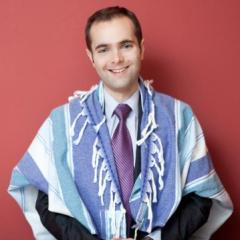
Volunteer of the Month: Cantor Josh Breitzer
In what capacity have you volunteered for the ACC?
At the last convention in Portland, I was asked to Chair the Concert Committee. I was also asked to be on the Fundraising & Development Committee; and I helped write the 60th anniversary retrospect, which was part of the 60th anniversary commemorative journal I’ve also served as one of the ACC delegates on the Joint Committee on Worship, Living and Religious Living. I started there as a student and have continued since being retroactively ordained. I am co-chair of the SSM Alumni Association.
What the best part of being a Cantor?
The way I’m able to use our liturgy, our tradition- and the myriad of musical resources to help people grow their Jewish identities. I take great pleasure out of taking tunes that are considered old and finding new ways to frame them, to re-arrange them, to get people excited about them again. I also enjoy bringing the best of our modern Jewish music to people’s attention. I also enjoy preparing students for B’nai Mitzvah, and finding ways to make cantillation exciting for them.
What about volunteering is the most rewarding for you?
I’ve really enjoyed getting to know some of my older colleagues better. During my work on the concert this past convention, I got to know not only some of, our established colleagues, but some of our GTM colleagues too. I understood that in so many ways we’re all on the same path leading to the same end. We wish to make our Jewish tradition more meaningful through the shared language of music. I’m projected orientated person. When tasks have a deadline, or a performance date it gives me the incentive to stay involved and on task.
In your opinion what’s the biggest challenge facing the cantorate, today and looking toward the future?
I don’t know if you had the chance to hear Mark Goldman at convention or his latest address but I think he hit the nail on the head, about looking where the puck is headed. We’re in a unique position to use our music and knowledge to understand the different trends where American Judaism is headed. We can bring different kinds of Jews together.so that we can relate to one another, regardless of how we affiliate. I think it’s going to require some really important conversations and some really important deliberations among us as cantors as to how we define ourselves, and how we let our various approaches to worship music define us. What ways do we let it limit us; what ways are we willing to experiment with each other and our clergy partners and other Jewish professionals to create moments in a worship, lifecycle, and classroom event. To connect people Jewishly in a way that makes the most sense for them.
What possessed you to become a Cantor?
My wife and I met as undergrads in music school; and then met again in grad school at the New England Conservatory. I wanted to harness my years of musical training towards a career that would enable us put down roots and provide us with a sense of financial security. I looked at the cantorate practically while simultaneously realizing how important my Jewish identity was to me. We went to a Passover Seder at her parent’s home. It was the first time I’d been away from my family for Pesach. And despite the new people and new stories of people around the table so much of the story was the same. It had the same cultural feel, The Haggadah was the same, and many of the melodies were the same tunes I was used to. It was very familiar and I realized it held aspects of my identity and would help form my professional life.
Tell us one thing about yourself that we might not know, but that you would want us to learn about you.
I think I would probably have to volunteer the fact that when I was in kindergarten I was known as the kid who knew all the state capitals. And so the big kids, the fourth and fifth graders in the hall who were being tested on this stuff in their classes, would approach me so I would be a resource for them. They’d ask me what the capitol of so and so was and I’d tell them. I think in the end my reputation was such, so that I could tell them anything and they’d believe me. I find it to continue to be true even to this day. Some sort of factual question, I seem to be the person people go to.

